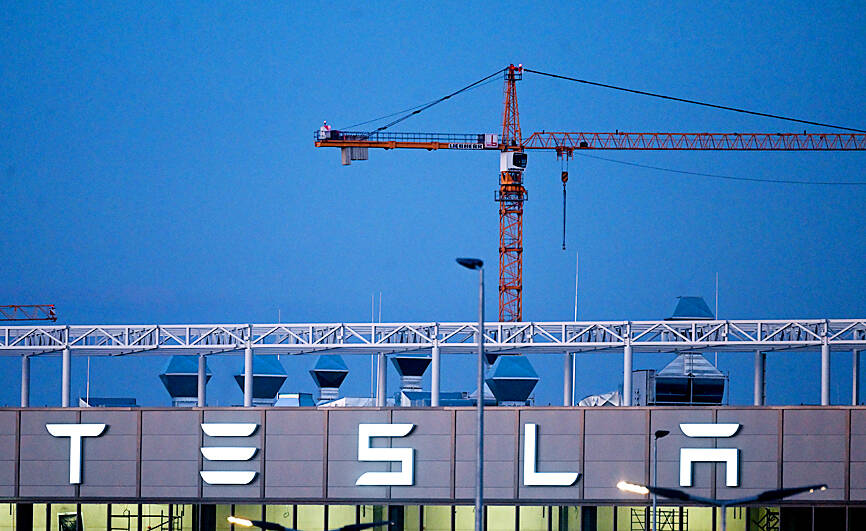Tesla Inc is to build a new battery factory in Shanghai that is to start production in the second quarter of next year, the Xinhua news agency reported.
The company led by Elon Musk, who is visiting China this weekend, made the announcement at a signing ceremony for the project in Shanghai, the report said.
Tesla is to manufacture its Megapack large-scale energy-storage unit in the new facility, which adds to the company’s Gigafactory for electric vehicles in Shanghai and deepens its investment in China.

Photo: EPA-EFE
Construction is scheduled to begin in the third quarter of this year and the plant is to commence in the second quarter of next year.
Tesla did not immediately respond to a request for comment.
The Megapack is intended as a massive battery to help stabilize energy grids, with the company saying each unit can store enough energy to power an average of 3,600 homes for one hour.
The new factory would initially produce 10,000 Megapacks every year, equal to about 40 gigawatt-hours of energy storage, Xinhua said, adding that the products would be sold worldwide.
Musk’s visit comes at a time of heightened tensions between China and the US over everything from an alleged Chinese spy balloon being shot down over US skies to Beijing’s partnership with Russian President Vladimir Putin amid his country’s war in Ukraine.
Musk is traveling with Tom Zhu (朱曉彤), who was named Tesla’s senior vice president of automotive this month.
Zhu joined in 2014 and led the construction and operations of Tesla’s factory in Shanghai, living in the facility during COVID-19 lockdowns.
He is one of just four named executive officers along with Musk, chief financial officer Zachary Kirkhorn and Drew Baglino, senior vice president of Powertrain and Energy Engineering.
After the US, China is Tesla’s largest market, accounting for 22.3 percent of revenue last year. The company increased shipments from its Shanghai plant last month.
In October last year, the electric vehicle maker — a major player in hyper-competitive China — cut prices on models produced at its enormous factory on the outskirts of Shanghai. Matters escalated in January, with another discount that left Tesla’s locally made vehicles as much as 14 percent cheaper than last year, and in some cases almost 50 percent less expensive than in the US and Europe.

Intel Corp chief executive officer Lip-Bu Tan (陳立武) is expected to meet with Taiwanese suppliers next month in conjunction with the opening of the Computex Taipei trade show, supply chain sources said on Monday. The visit, the first for Tan to Taiwan since assuming his new post last month, would be aimed at enhancing Intel’s ties with suppliers in Taiwan as he attempts to help turn around the struggling US chipmaker, the sources said. Tan is to hold a banquet to celebrate Intel’s 40-year presence in Taiwan before Computex opens on May 20 and invite dozens of Taiwanese suppliers to exchange views

Application-specific integrated circuit designer Faraday Technology Corp (智原) yesterday said that although revenue this quarter would decline 30 percent from last quarter, it retained its full-year forecast of revenue growth of 100 percent. The company attributed the quarterly drop to a slowdown in customers’ production of chips using Faraday’s advanced packaging technology. The company is still confident about its revenue growth this year, given its strong “design-win” — or the projects it won to help customers design their chips, Faraday president Steve Wang (王國雍) told an online earnings conference. “The design-win this year is better than we expected. We believe we will win

Chizuko Kimura has become the first female sushi chef in the world to win a Michelin star, fulfilling a promise she made to her dying husband to continue his legacy. The 54-year-old Japanese chef regained the Michelin star her late husband, Shunei Kimura, won three years ago for their Sushi Shunei restaurant in Paris. For Shunei Kimura, the star was a dream come true. However, the joy was short-lived. He died from cancer just three months later in June 2022. He was 65. The following year, the restaurant in the heart of Montmartre lost its star rating. Chizuko Kimura insisted that the new star is still down

While China’s leaders use their economic and political might to fight US President Donald Trump’s trade war “to the end,” its army of social media soldiers are embarking on a more humorous campaign online. Trump’s tariff blitz has seen Washington and Beijing impose eye-watering duties on imports from the other, fanning a standoff between the economic superpowers that has sparked global recession fears and sent markets into a tailspin. Trump says his policy is a response to years of being “ripped off” by other countries and aims to bring manufacturing to the US, forcing companies to employ US workers. However, China’s online warriors